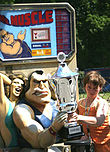Szpilman Award

The Szpilman Award is an annual art prize. It is awarded to works that exist only for a moment or a short period of time. The purpose of the award is to promote such works whose forms consist of ephemeral situations.[1] It was first presented in 2003 and is still the only award for ephemeral works worldwide.[citation needed] The prize is open for the public.
Background[]
The Szpilman Award is initiated, financed and organized by German-based art group Szpilman. It was founded in 2003.[2] Initially only people from Germany could apply. Regulations were changed in 2004 and opened the call for Europe. The public interest in the prize raised. In 2006 Szpilman abolished any restrictions: everyone from all over the world[3] can apply now for the Szpilman Award. The winner is chosen by a panel of up to 10 independent judges including the winner of the previous year. The prize is accompanied with a dynamic cash award (sum of money collected by members of the jury parallel to the competition, called "Jackpot Stipendium"), a trip to Cimochowizna (Poland), and a challenge cup whichwill be handed over to the next prize winner in the subsequent year.[4]
Since 2008 the Szpilman Award is also running a daily bulletin about ephemeral works, called "Potz!Blitz!Szpilman!".[5]
To make ephemeral works more public and to show a greater variety of possibilities members of Szpilman Award curate exhibitions since 2006 in cities all around the world, called Szpilman Award Shows, e.g. in galleries, museums and public spaces in Austria, Germany,[6] Greenland, Israel, Italy,[7] Switzerland,[8] The Netherlands and Turkey.[9]
Winners and shortlisted artists[]
| Year | Winner | Work | Shortlisted | Notes |
|---|---|---|---|---|
| 2003 | (Germany) |
'Keep on' | Shannon Bool David Borchers Karin Felbermayr Stefan Hurtig Alice Musiol Gudrun Schuster |
|
| 2004 | (Austria) |
'Ausstellung in der galerie.kärnten' | Shannon Bool David Borchers & Gregor Schubert Matthias Lehmann Alice Musiol Gloria Zein |
|
| 2005 | [10] (Kosovo[a]) |
'Embassy of the Republic of Kosova, Prague, Czech Republic' | Wolfgang Breuer C5 Sarah Ortmeyer Michael Part Simone Slee Adrian Williams |
|
| 2006 | [11] (Germany) |
'Wenn jeder denkt, es ist für alle, dann füttert niemand die Fische' | Oleg Buryan Pol Matthé Stefanie Trojan |
|
| 2007 | (United Kingdom) |
'Untitled (Muslim in Cage in Freud Museum)' 'Here' |
Evangelia Basdekis Anja Brendle & Sebastian Höhmann MeMe Marc Nothelfer Poison Idea |
|
| 2008 | [12] (Poland) |
'Swing' | Giorgina Choueiri Julia Dick Sai Hua Kuan Kate Mitchell Chris Richmond |
|
| 2009 | [13] (Germany) |
'In den Zillertaler Alpen' | Jennyfer Haddad Gerard Herman Jaroslav Kyša Roy Menahem Markovich Alexander Thieme |
|
| 2010 | & [14] (The Netherlands & Indonesia) |
'Treebute from Yogya' | Anna Gohmert Jennyfer Haddad Maria Victoria Muñoz Castillo Berndnaut Smilde Tomas Werner |
|
| 2011 | [15] (United Kingdom) |
'The Barrier' | Jaś Domicz David Horvitz Petr Krátký Jinho Lim Péter Szabó |
|
| 2012 | [16] (Bulgaria) |
'Bribe a Jury' | Kush Badhwar Alex Jones Max Schranner Amanda Wachob |
|
| 2013 | [17] |
'Untitled' | Vojtěch Fröhlich, Ondřej Mladý, Jan Šimánek and Vladimír Turner Ilisie Remus Marwin Rüffer RoByn Thompson Dominic Watson |
|
| 2014 | [18] |
'1,2,3,4' | Robert Mădălin Demeter, Alexis Dworsky & Joachim Kaiser Dávid Gutema & Dávid Mikulán Lodewijk Heylen Maciej Szczęśniak |
Jury[]
- Bernd Euler (Germany)
- Lise Harlev (Denmark)
- Anna Henckel-Donnersmarck (Germany)
- Leonard Kahlcke (United Kingdom)
- Patrick Koch (Germany)
- Tina Kohlmann (Greenland)
- Claus Richter (Germany)
- Tina Schott (Belgium)
- Michał Sznajder (Poland)
- prize winner of the previous year
See also[]
Notes and references[]
Notes:
| a. | ^ Kosovo is the subject of a territorial dispute between the Republic of Kosovo and the Republic of Serbia. The Republic of Kosovo unilaterally declared independence on 17 February 2008. Serbia continues to claim it as part of its own sovereign territory. The two governments began to normalise relations in 2013, as part of the 2013 Brussels Agreement. Kosovo is currently recognized as an independent state by 97 out of the 193 United Nations member states. In total, 113 UN member states are said to have recognized Kosovo at some point, of which 15 later withdrew their recognition. |
References:
- ^ Nunez-Fernandez, Lupe: "Mahony at Austrian Cultural Forum" Archived 2007-11-23 at the Wayback Machine Saatchi Online, 9 May 2007.
- ^ Weber, Grit: Szpilman Award, art kaleidoscope, page 23, January 2009.
- ^ "Who participates in the Szpilman Award? " Archived 2008-12-25 at the Wayback Machine Szpilman Award: Information, viewed: 12 January 2009.
- ^ Vvoi: "Szpilman Award: carpe diem, one ephemeral step at a time" New Art blog, 16 May 2007.
- ^ "In love with ephemeral" Sleek Magazine No.22, page 94, September 2009.
- ^ "Mer spingkse, wat kütt. Szpilman Award Show #12 – Clages". Clages. Retrieved 2016-02-20.
- ^ "Präsentation – Szpilman Award Show #10". www.villaromana.org. Retrieved 2016-02-20.
- ^ "La Placette". www.laplacette.ch. Retrieved 2016-02-20.
- ^ "Szpilman Award: Night of the Sunglasses". www.manzara-perspectives.com. Retrieved 2016-02-20.
- ^ Paulson, Marc: Apply Now!, Laser Magazin, page 24-28, April 2007.
- ^ Bieber, Alain: "Szpilman Award 2007" Archived 2013-08-20 at the Wayback Machine rebelart.net, 18 March 2007.
- ^ Bosetti, Petra: "Ein Preis für (fast) nichts" art magazin, 25 November 2008.
- ^ "Hank Schmidt in der Beek: In den Zilltertaler Alpen" Archived 2013-09-21 at the Wayback Machine ArtSchoolVets, 10 May 2009.
- ^ Bianpoen, Carla: "The quest for survival" The Jakarta Post, 7 May 2013.
- ^ HR Stamenov; Petkova, Bora: Practices in Public Environment, 2012, page 92.
- ^ Klopp, Tina: "Wie verkauft man eine Performance?" Die Zeit, 7 July 2013.
- ^ "Szpilman Award 2013". Retrieved 18 February 2015.
- ^ "Szpilman Award 2014". Retrieved 18 February 2015.
External links[]
- Visual arts awards






